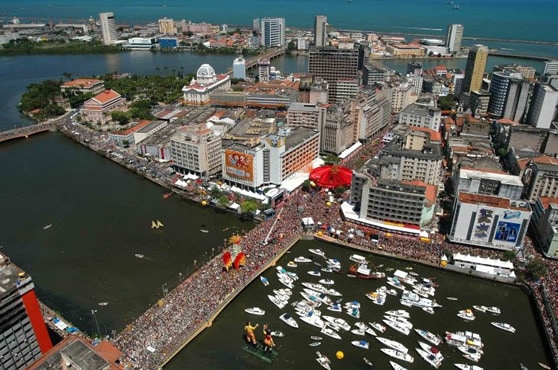
Brazil Carnival
History of Carnival in Recife and Olinda
The history of the Carnival in Recife and Olinda.
The Portuguese chose Recife as one of their first settlements in 1537. After a brief rule by the Dutch between 1630 and 1654, the Portuguese established a stronghold in the region with the sugarcane industry beginning to flourish under the leadership of Duarte Coelho Pereira. The Portuguese strategy of employing native Brazilians to work in their sugarcane fields did not work well. As a result African slaves were brought to work on the plantations. These tribes were greatly influenced by the culinary, art, music, and dance forms of Brazil.

Galo da Madrugada and the Recife Carnival
Recife and Olinda have been carnival hotspots in Brazil for a long time. The carnival in Recife has both tourists and Brazilians come down to enjoy a week of dancing and partying all night long. The old town of Recife Antigo comes to life during the carnival with music stages set up all over the city. To experience Recife’s culture, the best time to plan your trip is during the 4-day carnival leading up to Ash Wednesday; the beginning of the Christian season of Lent.
Undoubtedly, the carnival in Recife is one of the biggest events in Brazil with hundreds of people dancing to the frevo, samba, maracatu and mangue beats. You wouldn’t want to miss the main attraction which is held at Pátio de São Pedro Square, led by the Galo da Madrugada or Rooster of the Dawn. This carnival tradition begins with bugle calls at dawn on Carnival Saturday, heralding the start of the Pernambucano carnival. The show features some of the best rhythmically and acrobatically influenced dancers from Brazil.
Frevo Fever
The Frevo is the most popular style of music played at the carnival in Recife. This style originated from a combination of European and Afro-Brazilian cultures. Civilian and military music bands in the past gave Frevo its distinctive character with plenty of brass instruments. The carnival also has the largest bloco or carnival street bands. These bands encourage the crowd of revelers to join them down the streets of Recife. More than a commercial extravaganza, the carnival in Recife is free for all, with the residents participating with their own carnival groups. They play their own variety of music and even plan their routes through the city of Recife.
Carnival in Olinda
The old colonial town of Olinda, a few miles from Recife, became a popular carnival spot for the masses since 1977 where every street corner has a band following their own routes. Children, parents, and grandparents all party together with political and social causes being common themes that are well presented through costumes and music.
One of the main attractions of the carnival in Olinda is the giant puppets made from papier-mâché. The Homem da Meia-Noite or Man of Midnight is the most famous puppet that officially opens the carnival in Olinda every year; a tradition since 1932. It is not uncommon to see many celebrities head for the carnival in Olinda and you are probably going to see many more at the 2025 carnival as well.